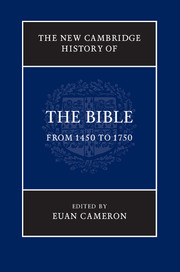Book contents
- Frontmatter
- Contents
- List of figures
- List of contributors
- Preface
- List of abbreviations
- Introduction
- PART I RETRIEVING AND EDITING THE TEXT IN EARLY MODERN EUROPE
- PART II PRODUCING AND DISSEMINATING THE BIBLE IN TRANSLATION
- 7 Publishing in print: Technology and trade
- 8 Latin Bibles in the early modern period
- 9 The Luther Bible
- 10 Bibles in the Dutch and Scandinavian vernaculars to c. 1750
- 11 German Bibles outside the Lutheran movement
- 12 Bibles in French from 1520 to 1750
- 13 English Bibles from c. 1520 to c. 1750
- 14 Bibles in Central and Eastern European vernaculars to c. 1750
- 15 Bibles in Italian and Spanish
- PART III PROCESSING THE BIBLE: COMMENTARY, CATECHESIS, LITURGY
- PART IV THE BIBLE IN THE BROADER CULTURE
- PART V BEYOND EUROPE
- Afterword
- Select bibliography
- Select Bible bibliography
- Index
13 - English Bibles from c. 1520 to c. 1750
from PART II - PRODUCING AND DISSEMINATING THE BIBLE IN TRANSLATION
Published online by Cambridge University Press: 05 August 2016
- Frontmatter
- Contents
- List of figures
- List of contributors
- Preface
- List of abbreviations
- Introduction
- PART I RETRIEVING AND EDITING THE TEXT IN EARLY MODERN EUROPE
- PART II PRODUCING AND DISSEMINATING THE BIBLE IN TRANSLATION
- 7 Publishing in print: Technology and trade
- 8 Latin Bibles in the early modern period
- 9 The Luther Bible
- 10 Bibles in the Dutch and Scandinavian vernaculars to c. 1750
- 11 German Bibles outside the Lutheran movement
- 12 Bibles in French from 1520 to 1750
- 13 English Bibles from c. 1520 to c. 1750
- 14 Bibles in Central and Eastern European vernaculars to c. 1750
- 15 Bibles in Italian and Spanish
- PART III PROCESSING THE BIBLE: COMMENTARY, CATECHESIS, LITURGY
- PART IV THE BIBLE IN THE BROADER CULTURE
- PART V BEYOND EUROPE
- Afterword
- Select bibliography
- Select Bible bibliography
- Index
Summary
Tyndale
Modern translation of the Bible into English begins with and is pre-eminently shaped by William Tyndale, a gifted scholar, linguist and writer of English. His claim that he ‘had no man to counterfeit [imitate], neither was helped with English of any that had interpreted the same or suchlike thing in the Scripture beforetime’ is not a denial that there were earlier English translations but a statement that the Wyclif Bible did not offer a model for translation from the original languages or for the use of the everyday English of the early sixteenth century. He created that model, translating the New Testament from Erasmus's Greek, and the Old Testament as far as the end of Chronicles, together with Jonah, from the Hebrew. Miles Coverdale revised and completed Tyndale's work. Thereafter a series of Bibles revised Tyndale and Coverdale's work until it became the King James Bible (KJB) or Authorised Version of 1611. In turn that became the prime model for later translations. Without Tyndale, the English Bible would have been a different and, very likely, a lesser thing.
Tyndale responded to ‘a learned man’ who had declared that ‘we were better be without God's law than the Pope's’, ‘I defy the Pope and all his laws… if God spare my life ere many years, I will cause a boy that driveth the plough shall know more of the Scripture than thou dost.’ Scripture, not the Catholic Church, gave God's word to man. Though he had hoped to find support from the Church, there was none to be had. Indeed, there was no place for such heretical work in England. He went to Belgium and Germany, and translated in peril, at last being martyred in Belgium.
His desire to write for the ploughboy determined the kind of language he should use: it had to be everyday English, not literary or ecclesiastical (registers that were hardly available at that time except through imitation of Latin). to the individual, both internally through baptism and through the Bible.It was a major problem to know how to translate: should he be literal or should he paraphrase? Should he trust the text to speak for itself or should he use annotation to explain the meaning?
- Type
- Chapter
- Information
- The New Cambridge History of the Bible , pp. 305 - 344Publisher: Cambridge University PressPrint publication year: 2016
- 2
- Cited by



